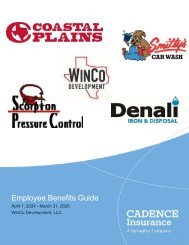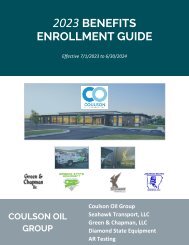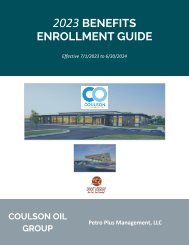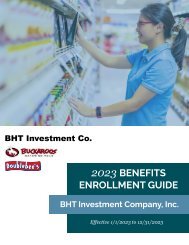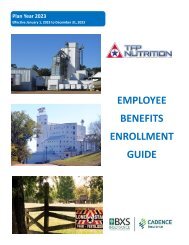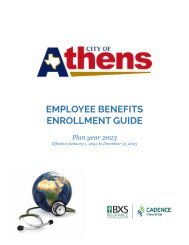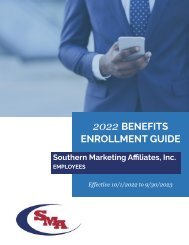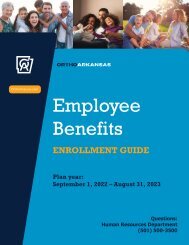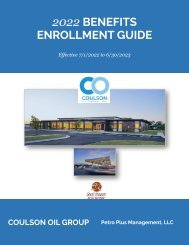Providence Engineering - 2023 Benefits Guide
Create successful ePaper yourself
Turn your PDF publications into a flip-book with our unique Google optimized e-Paper software.
COMPLIANCE DISCLOSURES<br />
Model General Notice of COBRA Continuation Coverage Rights Continued<br />
COBRA continuation coverage is a temporary continuation of coverage that generally lasts for 18 months due to employment termination or reduction of hours of work.<br />
Certain qualifying events, or a second qualifying event during the initial period of coverage, may permit a beneficiary to receive a maximum of 36 months of coverage.<br />
There are also ways in which this 18-month period of COBRA continuation coverage can be extended:<br />
Disability extension of 18-month period of COBRA continuation coverage<br />
If you or anyone in your family covered under the Plan is determined by Social Security to be disabled and you notify the Plan Administrator in a timely fashion, you and<br />
your entire family may be entitled to get up to an additional 11 months of COBRA continuation coverage, for a maximum of 29 months. The disability would have to<br />
have started at some time before the 60th day of COBRA continuation coverage and must last at least until the end of the 18-month period of COBRA continuation<br />
coverage.<br />
Second qualifying event extension of 18-month period of continuation coverage<br />
If your family experiences another qualifying event during the 18 months of COBRA continuation coverage, the spouse and dependent children in your family can get up<br />
to 18 additional months of COBRA continuation coverage, for a maximum of 36 months, if the Plan is properly notified about the second qualifying event. This<br />
extension may be available to the spouse and any dependent children getting COBRA continuation coverage if the employee or former employee dies; becomes entitled<br />
to Medicare benefits (under Part A, Part B, or both); gets divorced or legally separated; or if the dependent child stops being eligible under the Plan as a dependent<br />
child. This extension is only available if the second qualifying event would have caused the spouse or dependent child to lose coverage under the Plan had the first<br />
qualifying event not occurred.<br />
Are there other coverage options besides COBRA Continuation Coverage?<br />
Yes. Instead of enrolling in COBRA continuation coverage, there may be other coverage options for you and your family through the Health Insurance Marketplace,<br />
Medicare, Medicaid, Children’s Health Insurance Program (CHIP), or other group health plan coverage options (such as a spouse’s plan) through what is called a “special<br />
enrollment period.” Some of these options may cost less than COBRA continuation coverage. You can learn more about many of these options at www.healthcare.gov.<br />
Can I enroll in Medicare instead of COBRA continuation coverage after my group health plan coverage ends?<br />
In general, if you don’t enroll in Medicare Part A or B when you are first eligible because you are still employed, after the Medicare initial enrollment period, you have<br />
an 8-month special enrollment period [1] to sign up for Medicare Part A or B, beginning on the earlier of<br />
●<br />
●<br />
The month after your employment ends; or<br />
The month after group health plan coverage based on current employment ends.<br />
If you don’t enroll in Medicare and elect COBRA continuation coverage instead, you may have to pay a Part B late enrollment penalty and you may have a gap in<br />
coverage if you decide you want Part B later. If you elect COBRA continuation coverage and later enroll in Medicare Part A or B before the COBRA continuation coverage<br />
ends, the Plan may terminate your continuation coverage. However, if Medicare Part A or B is effective on or before the date of the COBRA election, COBRA coverage<br />
may not be discontinued on account of Medicare entitlement, even if you enroll in the other part of Medicare after the date of the election of COBRA coverage.<br />
If you are enrolled in both COBRA continuation coverage and Medicare, Medicare will generally pay first (primary payer) and COBRA continuation coverage will pay<br />
second. Certain plans may pay as if secondary to Medicare, even if you are not enrolled in Medicare.<br />
For more information visit https://www.medicare.gov/medicare-and-you.<br />
[1]<br />
https://www.medicare.gov/sign-up-change-plans/how-do-i-get-parts-a-b/part-a-part-b-sign-up-periods.<br />
If you have questions<br />
Questions concerning your Plan or your COBRA continuation coverage rights should be addressed to the contact or contacts identified below. For more information<br />
about your rights under the Employee Retirement Income Security Act (ERISA), including COBRA, the Patient Protection and Affordable Care Act, and other laws<br />
affecting group health plans, contact the nearest Regional or District Office of the U.S. Department of Labor’s Employee <strong>Benefits</strong> Security Administration (EBSA) in your<br />
area or visit www.dol.gov/ebsa. (Addresses and phone numbers of Regional and District EBSA Offices are available through EBSA’s website.) For more information<br />
about the Marketplace, visit www.HealthCare.gov.<br />
Keep your Plan informed of address changes<br />
To protect your family’s rights, let the Plan Administrator know about any changes in the addresses of family members. You should also keep a copy, for your records, of<br />
any notices you send to the Plan Administrator.<br />
Plan contact information<br />
Robin Liggett, <strong>Providence</strong> <strong>Engineering</strong>, 1201 Main Street, Baton Rouge, LA, 70802, P: 225-766-7400, E: robinliggett@providenceeng.com.<br />
40



